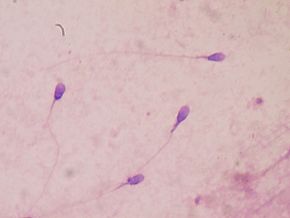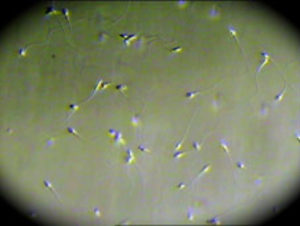 Another problem for overweight or obese men: an increased risk of poor sperm quality. Researchers in India found that compared to normal weight men, obesity was associated with lower sperm count, lower volume of semen, lower sperm concentration, poor sperm motility (the movement of sperm), as well as sperm defects. There is some evidence (from other studies and the researchers own work) that there is improvement in sperm quality with weight loss.
Another problem for overweight or obese men: an increased risk of poor sperm quality. Researchers in India found that compared to normal weight men, obesity was associated with lower sperm count, lower volume of semen, lower sperm concentration, poor sperm motility (the movement of sperm), as well as sperm defects. There is some evidence (from other studies and the researchers own work) that there is improvement in sperm quality with weight loss.
The researchers pointed out that other studies have shown that "paternal obesity at conception had deleterious effects on embryo health, implantation, pregnancy, and live birth rates." And that poor sperm quality is a cause of infertility. So.... what do the researchers recommend? Weight loss and exercise, and perhaps bariatric surgery, for obese men having fertility problems due to poor sperm quality. From Medical Xpress:
As men's weight rises, sperm health may fall
A widening waistline may make for shrinking numbers of sperm, new research suggests. Indian scientists studied more than 1,200 men and found that too much extra weight was linked to a lower volume of semen, a lower sperm count and lower sperm concentration. In addition, sperm motility (the ability to move quickly through the female reproductive tract) was poor. The sperm had other defects as well, the researchers added. Poor sperm quality can lower fertility and the chances of conception.
"It's known that obese women take longer to conceive," said lead researcher Dr. Gottumukkala Achyuta Rama Raju, from the Center for Assisted Reproduction at the Krishna IVF Clinic, in Visakhapatnam. "This study proves that obese men are also a cause for delay in conception," he added.
But in continuing research, the study team is looking to see if losing weight will improve the quality of sperm. Although that study is still in progress, early signs look good that sperm quality improves as men lose weight, Rama Raju said. Recent reports have found that extreme weight loss after bariatric surgery reversed some of the sperm decline, he said.
For the study, Rama Raju and his colleagues used computer-aided sperm analysis to assess the sperm of 1,285 men. Obese men, they found, had fewer sperm, a lower concentration of sperm and inability of the sperm to move at a normal speed, compared with the sperm of men of normal weight. Moreover, the sperm of obese men had more defects than other sperm. These defects included defects in the head of the sperm, such as thin heads and pear-shaped heads. [Original study.]
 Human sperm. Credit: Wikipedia
Human sperm. Credit: Wikipedia

 Sperm under microscope. Credit: Fertility Associates Ltd. NZ
Sperm under microscope. Credit: Fertility Associates Ltd. NZ